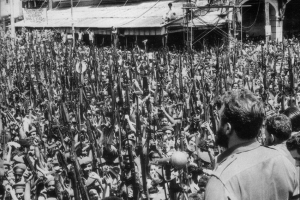
Originally published in the March 2016 issue of Liberation Newspaper.
Known in the United States as the Bay of Pigs invasion, Playa Girón, or Girón Beach in English, as the Cubans refer to it, was the first time U.S. imperialism was defeated. The events surrounding Playa Girón have a historic significance, not only for Cuba, but for the entire struggle of the oppressed throughout Latin America and the world. In less than 72 hours, the Cuban people not only proved to the world that a small sovereign nation could defend itself against the biggest military power in the world, but that it could do so while declaring itself a socialist revolution in the process.
After the heroic victory of the Cuban Revolution under the leadership of Fidel Castro in 1959, Cuba fought against constant U.S.-sponsored terrorism by counter-revolutionaries seeking to overthrow the will of the Cuban masses who had liberated themselves from the U.S.-backed dictator Fulgencio Batista. One of the most infamous attacks took place March 4, 1960, when the CIA orchestrated the bombing of the Belgian freighter La Coubre, killing over 100 people and injuring hundreds more.
As if these constant acts of terror were not enough, the United States helped train mercenaries and plan a military invasion campaign from within Guatemala and Nicaragua and in several U.S. states like Florida and Alabama. The campaign, which had the objective of overthrowing the revolutionary government of Cuba, began on April 15, 1961, two days before the actual ground invasion of Playa Girón. On that day, several U.S. planes that were painted to look Cuban flew out of Nicaragua and bombed three airports with the goal of neutralizing Cuba’s air force. The attack killed several civilians.
The attack prompted thousands of Cubans to take to the streets on April 16 to pay tribute to the innocent lives lost the day before. It was on this day that Fidel Castro gave a historic speech. On the corner of 23 Ave. and 12 St. in central Havana, as the funeral cortege was leaving the Colón cemetery after the burial of those killed the day before and amidst a massive crowd of armed revolutionaries, Fidel proclaimed the Cuban Revolution to be a socialist revolution.
He connected the great achievements of the agrarian reform, education and health programs, to the struggle against imperialism and tied them all together to the need for socialism. Analyzing the moment, he correctly stated, “What they cannot forgive is that we have made a socialist revolution right under the very nose of the United States!”
The declaration was welcomed by the thousands of women and men in attendance who lifted their rifles in a sign of approval for the direction of the Revolution.
The whole country mobilized along with the Revolutionary Armed Forces to protect the newly declared socialist revolution from imperialist invasion. The whole country was on alert; no one knew where the invasion would occur. The U.S. imperialists banked on their bombing campaign to disrupt Cuba’s ability to fight back, because their plan went far beyond just landing 1,500 Cuban mercenaries.
Their idea was that once the invaders established a beachhead, U.S. Marines would land to help the so-called “provisional government.” Several U.S. warships waited off the coast. Counterrevolutionary ground troops of the mercenary brigade 2506 landed on April 17, 1961.
The operation was met by a large and highly coordinated Cuban resistance whose direct command came from Fidel, who was to be found on the frontlines of the battle against the invading counterrevolutionaries.
Using all the equipment and armaments available to them and after intense fighting that led to the death of over 150 revolutionaries, the armed forces crushed the invasion. With it, they crushed the hopes of U.S. imperialism to once again control the resources and destiny of a socialist nation only 90 miles off its coast.
Imperialist critics of the U.S. failure claim that it was defeated because Kennedy withdrew air strikes that were planned during the invasion. But the truth is that the U.S. government failed—and still fails—to see that the revolution had such massive support that no amount of military power was going to succeed.




